– November 10, 2018 –
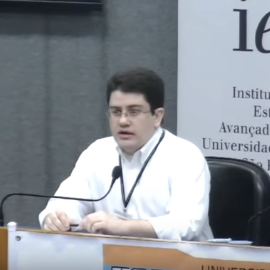
On June 21, 2018, at the Institute of Advanced Studies of the University of São Paulo (IEA-USP), occurred the seminar from Center of Studies on Society and Technology (CEST) on the Brazilian public services quality and its relationship with Law 13,460, also known as the Law of Protection and Defense of the Public Services Users Rights. Organized by CEST’s researcher Eduardo Bertassi, the event brought professionals and academics from different areas to discuss the theme of the event from four points of view: legal, sociological, educational, and quality control.
CEST’s academic coordinator, Prof. Edison Spina Ph.D., welcomed the participants and opened the day’s activities highlighting the importance of always discussing and looking at technological and social issues from a multidisciplinary point of view, which is CEST’s purpose and mission.
Afterward, Eduardo Bertassi explained the motivations that led him to propose the event. Starting from the investigation on how the adoption of quality control processes in the manufacture of software for crowdsourcing could benefit society, the researcher came upon Law 13.460, a law that not only had national coverage but that would go into force precisely on the seminar’s day. Eduardo commented that the law, not only regulates the citizens right to have access to quality public services, could also mean an important step towards providing quality services prioritize, as long as there was a commitment to follow it on the part of public managers.
The legal scope
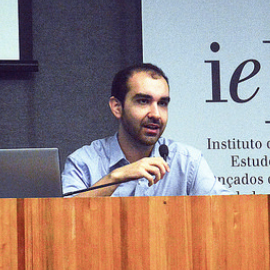
Professor Dennys Antonialli Ph.D., from the Law Faculty of the University of São Paulo, was in charge of discussing the topic from the legal point of view. Antonialli began his speech emphasizing the importance of not only looking at the legal aspects of the law but also at the diverse aspects that could be promoted with its implementation. However, he commented that a real view of the impacts of the law enforcement would only be possible from empirical research done after a certain temple from the beginning of its validity.
The professor said that the purpose of the regulation, when it was created, was that it be applied directly and indirectly in the administration and services provision of public interest. As an example of indirect application, the professor mentioned the Eletropaulo case, which despite being a private company it promotes a service of general interest; therefore, the company would also be subject of enforcing and guaranteeing the guidelines provided by the law such as urbanity, accessibility, respect, among others.
Later, Antonialli listed the rights guaranteed by the regulation, which would be: citizen participation, freedom of choice, access and protection of personal information, access to document printing, obtaining accurate and accessible information, and access to the Services Charter offered by public entities.
Later, Antonialli listed the regulations’ guaranteed rights, which would be: citizen participation, freedom of choice, personal information’s access and protection, document printing access, the concession to accurate and accessible information, and access to the Services Charter offered by public entities. Also, the professor pointed out that Law 13,460 used some instruments to ensure compliance with regulations such as the users’ free expression, the use of ombudsmen, the user councils creation and the preparation of reports to show the public quality services evolution or degradation provided according to specified quality indicators.
However, the professor warned that there are several questions about the real enforcement of the law. According to him, some believe that the law is only a formal document without much impact since the real representativeness and regulation effect depends on many aspects related to the dynamics and the of public agencies functioning.
Finally, Antonialli explained the need for the Brazilian public sphere to establish objective metrics and criteria to allow the real conditions of public services to be evaluated in comparison with the situation experienced in other countries.
The sociology field
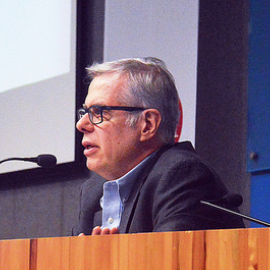
Professor John Sydenstricker-Neto Ph.D., a sociologist, and professor from the Mackenzie Presbyterian University began his presentation describing what he called as the binomial need for public services provision: cordiality, and quality.
“The Brazilian man is essentially a cordial man,” he said, supported by Sérgio Buarque de Holanda’s thesis on the cordial man in the book Raízes do Brasil (Roots of Brazil). “That is, we are a people that prioritize the emotional aspect and affectivity in interpersonal relations, including in the area of public services provision”. According to the professor, “Being cordial, however, does not guarantee the services quality, quite the contrary; our excessive cordiality hinders the existence of objectivity and impersonality in public areas and relationships in general. One of the consequences of this is the excessive bureaucracy that exists in the country, in an attempt to make impersonal a process that would not have to be so exhaustive and complicated. “
The professor made a brief comparison between the public services offered in Europe and the public services provided in Brazil. In Europe, while cordiality and affectivity are not considered essential, quality is, making services more impersonal and therefore more just. In Brazil, the opposite occurs, and the sociologist raised the following question: “Why does it seem so important to be ‘well-treated’ and not ‘well-served’?”, i.e., why do we consider the cordiality from one to another more important than the quality of service being offered?
Professor John pointed out that certain dualities that present in our daily lives are even portrayed in Brazilian literature. Dualities such as work and adventure, method and informality, impersonality and affectivity were characterized in books as our people’s trademark, creating the “Brazilian myth”, as can be seen in characters such as Jeca Tatu or Macunaíma. For him, the most important thing is learning to reflect on these myths so that we can evolve from them. He cites, then, the phrase of the anthropologist Darcy Ribeiro, “The most important thing is to invent, or to reinvent Brazil”.
Therefore, Prof. John highlights that when presenting the word “binomial” in his speech to describe quality and cordiality, he says that it was a hand-picked word to contrast the meaning of two opposing things. “‘Binomial’ implies a duality that has been overcome, a double of factors that are not excluded, but work together in balance,” he said. According to him, to achieve balance, we must observe and be inspired by cases that worked. He cited the example of Santana do Seridó city, in Rio Grande do Norte, which to avoid drought, began to use treated sewage as the primary source of agriculture’s water. The city did not have to create new laws; the inhabitants and the local government just began solving by themselves the problems that prevented compliance with existing sanitation and sewage treatment laws.
The educational point of view
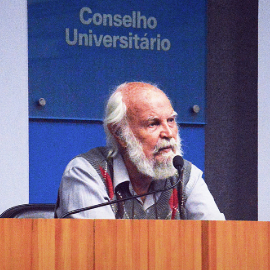
Professor Luiz Barco Ph.D., a retired teacher from the School of Communication and Arts of the University of São Paulo, addressed the educational aspects that permeate the structure established in the country. He began his speech by saying that the discussion freedom degree and questioning tone present within universities should be implemented from primary school. In his opinion, that is a way to improve not only future professionals but people who will make up society. He exalted that the meaning of the verb “to develop” did not imply the destruction of the past or the unknown, but rather the construction of knowledge and assimilation of new concepts.
Later on, Professor Barco added his insight into today’s teacher roles. “A teacher should be a dream builder”, because according to him, “It is the teacher’s duty lead the student to transcend his ideas, and not just to repeat them.” For him, only in this way would the students be able to build real knowledge and develop a critical sense of their masters’ teachings, magnified by a questioning personality.
At the end of his speech, Barco presented his vision on the guidelines that the academic sphere is taking. In his opinion, the world is becoming, in many aspects, increasingly complex; therefore, it is of the utmost importance that science creates, develops, and disseminates a new way of addressing the issues so that complexity can be treated in a transdisciplinary way.
Quality control
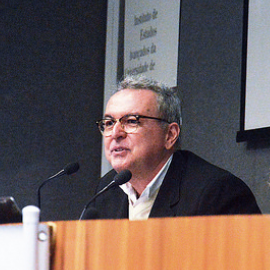
The last speaker of the event, Professor Kleber Cavalcanti Nóbrega Ph.D., member of the Brazilian Quality Academy, spoke about the importance of quality management in public services and explained the quality concept evolution over the years. The older concept refers only to the inherent product quality, but over time the idea got broaden meaning the quality of the process in which the product was manufactured. Afterward, quality became associated with the system in which the processes belonged and today; the broader concept also encompasses the organizational quality of the company, i.e., it considers the individuals quality of life.
Another important point in the teacher’s speech was to illustrate the difference between public management and private management. In private management, there is a greater commitment on the part of the employees due to the imposition of the focus on the results aiming the profit and positive results of the company. In the case of public management, the teacher said a phrase that depicts the public management situation in Brazil: “In Germany, what is public belongs to everyone, in Brazil what is public belongs to nobody”.
Professor Kleber analyzed the “serving act” in comparison to “serving behavior”. “Serving” is defined by the doctor as “the act of performing activities aimed at providing benefits to those who are served.” For a service provider to be considered a “server”, one must have the characteristics of the capacity to help, take initiatives, seek simplicity and utility, among others. According to him, “The formula of how to serve better is in the improvement of both the service and the behavior of the server, a formula that brings us to the binomial of quality and cordiality presented by Professor John”.
To conclude, the professor classified Law 13,460 as a “servant” law, since it grants more rights than duties.
To access the event material (presentations, photos, and videos), click here.
Text by Fernanda Pinotti and Tiago Medeiros (Jornalismo Júnior da USP)
Reviewed and translated by Eduardo Bertassi
 English
English Português
Português
